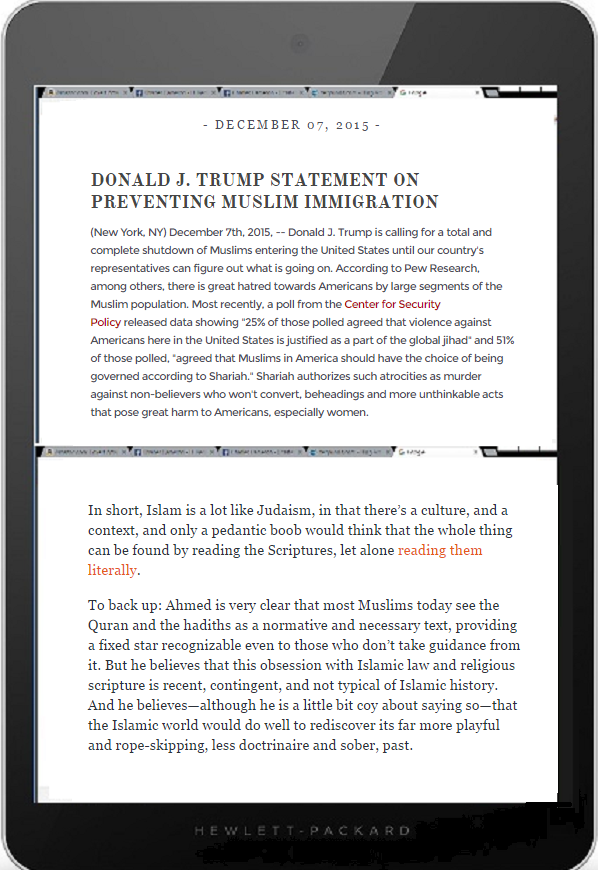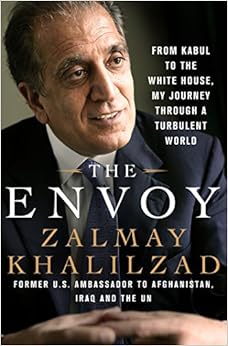A brief Trump policy statement & book-length question in response
Sunday, July 10th, 2016[ by Charles Cameron — also a tweet asking for a DoubleQuote & getting one ]
.
As so often, Part I of this post is a somewhat playful teaser for Part II, which is where my real interest is to be found.
Part I, then, is about someone inquiring about two tweets Donald Trump made, asking in effect whether anyone had DoubleQuoted them:.
Has anyone juxtaposed that Trump tweet about Muslim sports stars and his tribute to Muhammed Ali yet?
— Martyn (@moc_moc_a_moc) June 4, 2016
I like this question because it shows that DoubleQuoting — and indeed it’s subset, DoubleTweeting — is not some lonely idea of mine, but a more general form of inquiry that I’m aiming to fashion into a specigic and teachable tool for thinking.
**
As it happens, one Chris Taylor responded to Martyn’s question the next day, putting the two tweets in question together. Sadly for my purposes, he did this by screengrabbing the pair of them, thus making it impossible to click through to Trump’s two originals. I’ve therefore gone to Trump’s timeline, and present them here as they originally appeared there:
Obama said in his speech that Muslims are our sports heroes. What sport is he talking about, and who? Is Obama profiling?
— Donald J. Trump (@realDonaldTrump) December 7, 2015
Muhammad Ali is dead at 74! A truly great champion and a wonderful guy. He will be missed by all!
— Donald J. Trump (@realDonaldTrump) June 4, 2016
I see this juxtaposition as having some mild merit as political argument, but mainly as a sort of nit-picky point-scoring — so I’ll leave it at that.
For anyone who’s interested, here’s a storified compilation of Donald Trump’s tweets on Islam, Muslims and the Middle East — I haven’t verified its contents or up-to-date-ness, but ran across it in my rooting around, and thought it might be of use to some here.
**
Part II is where things get interesting.
In the DoubleQuote below, I have posted excerpts from two documents — in the upper panel, Donald Trump’s news release on the prevention of Muslim immigration, and in the lower panel, a couple of paragraphs from the Tablet magazine review of the late Shahab Ahmad‘s extraordinary book, What is Islam, published this year by Princeton UP, and described in a blurb by Harvard Law’s Noah Feldman as “Not merely field changing, but the boldest and best thing I have read in any field in years.”
Boiled down to it’s haiku-like essence, this twofer goes like this:
Trump: single page, single strand statement about banning Muslims Ahmad: 550 page, multiple strand question as to how to define Muslims
**
It’s inevitable that much of our popular — meaning “of the people, by the people, for the people” — discussion of Islam, brought on principally by the as yet but poorly understood connection between Al-Qaida and Islam, and exacerbated more recently by the equivalent link with the (so-called) Islamic (so-called) State — is framed in headlines and soundbites.
Such single-stranded short-form messaging cannot hope to convey much at all of reality, and to get a deeper dive into what the words Islam and Muslim point to, one could hardly do better than The Study Quran for Islam’s central scripture, Jonathan Brown‘s Misquoting Muhammad for the history and interpretation of the corpus of hadith — and Ahmad’s What is Islam for the amazing richness of the Islamic traditions across continents and centuries.
Somewhere between the single words Muslim and Islam on the one hand, and the 550 pages of Ahmed’s erudition, aided and abetted by 44 pages of notes in small type and a substantial index on the other, there’s an awareness of rich complexity, perhaps sufficient for a 25-page essay or 125-page Oxford Very Short Introduction, that we could all benefit from applying to our political considerations of Islam in these fraught times.





